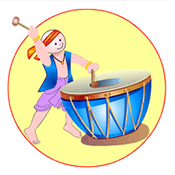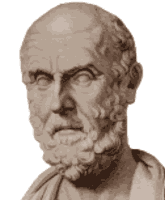
Dimdima
Online Children's Magazine from India

Dimdima
Online Children's Magazine from India
The father of medicine
| Date of Birth-Death :460 B.C - 377 B.C |
| Country of Birth : Greece |
| Major Discoveries : The Science of Medicine |
|
Writing by the Scientist : Corpus Hippocraticum (Hippocratic Corpus) |

This was an era when people believed that humans suffered from diseases because of supernatural causes such as the action of unfriendly spirits, ghosts, and demons, or from witchcraft. There was no science of medicine. Superstition was very deep rooted in the society.
It was during these times that Hippocrates was born on the Aegean island of Cos, in Greece. What is known of Hippocrates is from the writings by famous scientists of those times, including those of Hippocrates himself. His teachers in medicine are said to have been his father, Heracleides, and Herodicos of Selymbria.
Hippocrates was the first to understand the workings of the human body through scientific experiments. He did not believe in any of the superstitious explanations given for the ailments of the human body, nor did he believe in miraculous cures. His extensive research in the field of medicine and disease earned him the name of Hippocrates Asclepiades, or "descendant of (the doctor-god) Asclepios."
Hippocrates’ observations of the human body, have been brought together in the form of a ten volume encyclopedia of medicine and surgery as known in his day. Hippocrates was the first to scientifically explain how the human body works, on the importance of good nutrition for a healthy mind and body, and that disease occurs when something goes wrong with the normal functioning of our body systems. These were revolutionary thoughts. His work not only gained undisputed popularity during his times, but have been accepted as the first step towards the Science of Medicine.
The contributions of Hippocrates to the field of medicine have stood the test of time. Even today when doctors graduate out of medical school they take an oath, called the Hippocratic oath, which has remained the universal standard for patient care down the years. In the oath, the physician pledges to work for the good of the patient, and to do him no harm.
EXPLORE MORE...
Get Help or Give Help.
- Do you have a Science Question?
- Post it here and get the answer.
- Some questions posted by others are not yet answered.
- View those questions and answer them.
Dimdima is the Sanskrit word for ‘drumbeat’. In olden days, victory in battle was heralded by the beat of drums or any important news to be conveyed to the people used to be accompanied with drumbeats.
Bharatiya Vidya Bhavan
K. M Munshi Marg,
Chowpatty, Mumbai - 400 007
email : editor@dimdima.com
Bharatiya Vidya Bhavan
505, Sane Guruji Marg,
Tardeo, Mumbai - 400 034
email : promo@dimdima.com
Dimdima.com, the Children's Website of Bharatiya Vidya Bhavan launched in 2000 and came out with a Printed version of Dimdima Magazine in 2004. At present the Printed Version have more than 35,000 subscribers from India and Abroad.